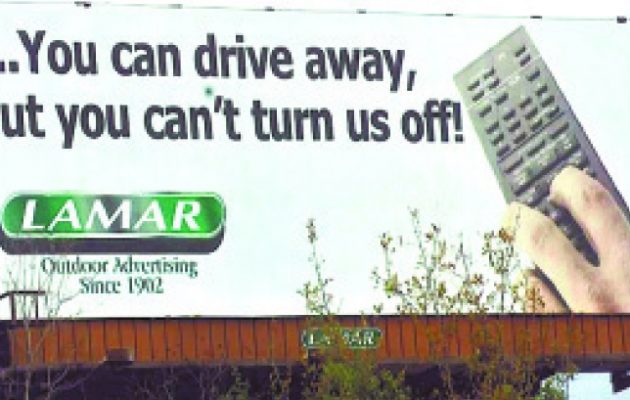Pressure on City Council to vote ‘no’ to billboards
Posted on September 30, 2014 By Editor Articles, Neighborhood News, Top Stories

History is often said to repeat itself, and although Jacksonville citizens voted almost 30 years ago to prohibit billboards through the addition of a Charter Amendment, the 19 members of City Council will soon be voting to determine if it will remain in effect or become part of history.
Ordinance 2013-493, written by Karl Sanders, an attorney lobbyist for ClearChannel Outdoor and introduced last year by City Councilman Richard Clark, seeks to set up rules for building billboards as replacements for existing signs and allows others to be put up in new locations. Under the legislation, sign owners could also switch from static billboards to digital billboards.
Critics say the bill will override the existing law, ignore the will of the people and allow larger billboards with alternating digital advertising.
In 1987, the first set of more than 17,000 signed petitions prompted the Duval County Supervisor of Elections to let voters voice whether they wanted the super-sized advertisements on Jacksonville’s roadways.
The majority, 59 percent of the electorate, voted to banish new billboards and remove hundreds of others from neighborhood roadways thereby approving the charter amendment that exists today.
Meanwhile, a permit to build a new billboard on 2110 Kings Avenue between Olevia and Bertha Streets was issued to ClearChannel Outdoor in August.
Alicia Grant, an Avondale resident and founding director of the beautification group, Scenic Advocates for Jacksonville, said that although the area of the proposed billboard is a sliver of land that lies outside both the Downtown and San Marco overlays, it is still an illegal billboard because it is digital – a violation of the 1987 Charter Amendment.
CBS Outdoor has previously proposed another billboard on Kings Avenue, which has already been denied by both the Downtown Investment Authority and the Downtown Development Review Board. Still, CBS Outdoor filed an appeal to City Council to erect the billboard as a replacement to the static billboard that was removed on the north side of I-95 as part of the Overland Bridge Project.
“It is frustrating that both companies continue to apply for permits for digitals and the City is issuing them,” explained Grant. “In the past, the Office of the General Counsel said this is the law and you have to abide by it. This is a 180 degree turn from what has happened in the past…if the lawsuits are decided in our favor then they hopefully will have to remove them and even possibly disgorge the revenues they have collected on the digitals since they were put up.”
As far as when all of this will be settled, Grant said the “date is a moving target,” but cautions that if the billboard companies prevail it will undo all past efforts to enforce billboard restrictions.
“If this bill passes through City Council in any form, all the efforts of the past are lost and the advertising industry has successfully struck a fatal blow to controlling billboards in Jacksonville,” explained Grant. “The powerful billboard companies will take home huge profits, Jacksonville’s citizens will be robbed of their democratic process, and our city will have gained nothing except more and bigger digital billboards everywhere.”
For Grant and other critics of billboard lobbyists, the concern reaches beyond the height of the towering billboards, into an attempt at voter nullification.
“It’s what the City Council people feel at the end of the day,” said Grant. “If it were to pass that means any voter referendum on the books, the City Council can change.
At-large Councilman John Crescimbeni intends to vote against the proposed ordinance emphasizing the importance of upholding the voter-approved Charter Amendment.
According to an email by Crescimbeni, “The introduction of Ordinance 2013-493…is nothing more than an attempt at voter nullification. If approved by the City Council, 2013-493 would gut the Charter Amendment. I believe the voters spoke loud and clear in 1987 and the City Council should respect the results of that election.”
James C. Rinaman, Jr., an attorney with Marks Gray, is familiar with the “long and complicated” history of the billboard industry.
In 1985, Rinaman served as president of the Jacksonville Community Council, Inc. when the organization conducted a study of visual pollution in Jacksonville. It was that study, which concluded that stricter regulations were necessary thereby prompting billboard critics to begin collecting petitions that resulted in the existing Charter Amendment.
“I don’t understand why City Council is doing this,” said Rinaman. “I told City Council they should take a drive down JTB or A1A in Ponte Vedra and see how beautiful the landscape is without billboards.”
Rinaman likens the billboards to television commercials. He said both are annoying but with TV ads at least you get free television programs.
“The billboard industry doesn’t give us anything, they just take,” said Rinaman. “It’s just unbelievable that the Council will do this, but I think they will.”
For more information and for ways to contact City Council to share your opinion, go to http://scenicadvocatesjax.org/take-action.html.
By Lara Patangan
Resident Community News




 (No Ratings Yet)
(No Ratings Yet)




